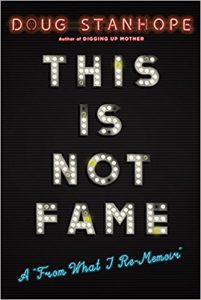Doug Stanhope is no Jim Jeffries, but his new audiobook is still pretty good.

“This is not Fame: A ‘From What I Re-Memoir,’” is the most recent book from author and comedian Doug Stanhope. The book is a collection of stories from life on the road that Dr. Drew Pinsky aptly describes as, “a story that Hunter S. Thompson would wish he could have lived.”
Recently, the book was released as an audiobook and if you are a fan of Stanhope, this is a must listen. Like his last book, “Digging Up Mother: A Love Story,” the audiobook version isn’t just a reading, but a radio-play with an incredible amount of director’s commentary from the people involved in the major stories.
The reading is made that much more engaging with small additions like the sounds of vomit hitting toilet water, to accompany a story where Stanhope pretended he was throwing up blood over the phone to play a joke on an interviewer who had mixed up his contact information with someone else.
Little additions like this make it that much more immersive to listen as him and his friend Chad Shank take turns reading chapters. You might think that people would be annoyed that Stanhope taps out from time to time to get a friend to fill in for him when it is his book, but Shank is a professional, and podcast regular, who reads Stanhope as well as Johnny Depp does for Thompson.
Some of the best parts are when Stanhope cracks up at his own absurd verbiage. One moment that sticks out is when he is describing having sex with a last call prostitute on mushrooms in Alaska, and then his erection collapses like, “the controlled demolition of Building 7.”
Moments like this make it feel like you are actually receiving a unique product when you purchase the audiobook instead of the just having the ability to read the book while driving.
The commentary in between chapters is like having mini-podcasts to fill in the gaps. It usually reveals where Stanhope had gone wrong in his memory and it manages to produce its own comedy in amending the mistakes of the final version of the book.
Comedians Brendan Walsh and Andy Andrist make several appearances throughout the book and give commentary to help provide more context to stories. Like the one where Walsh purposefully urinated on his own hotel bed, if only to clarify that he believed he had done it from the dresser and not just while standing directly on the bed. Or, when Andrist concocted a scheme to track down the man who had molested him as a child to try and confront him with the hopes of getting the car he was promised in exchange for his silence many years prior.
Each story is seemingly more absurd than the last, all with a dark undertone that leaves you in awe of their unique ability to turn tragedy into comedy. It is a skill that is invaluable for overcoming the hardships of life and Stanhope has managed to turn it into a long career.
Stanhope is also a man that is full of contradictions. He talks about resenting praise or comparisons to other great comedians and yet, he also can’t stand people who criticize him. If anything the contradictions make him human and that is what is important in nonfiction. But, I can’t help but find myself thinking, which is it Mr. Stanhope? Do you want people to love you or hate you?
I guess that’s a dumb question because no-one wants to be hated. People that say they do are just trying to seem above the hate they already receive. But, my biggest criticism is that Stanhope is apologetic of himself or his comments sometimes for no real reason at all. He defends his use of the word “f*****,” or tries to justify a shallow assessment of someone’s looks, when in reality no one who has taken the time to read his book would disagree or care about the reasoning behind that at all.
It seems like a move designed to appease his critics, but he doesn’t seem to pay much attention to them anyway so really, what is the difference? Even though the instances where Stanhope turns apologetic are slim to none, they are really the only truly out of place aspects of his work.
You’d never see him apologize for a joke on stage. So, why go that route now, even if it is just in the form of a clarifying sentence. His attempts at modesty are the most sickening thing about him in that he is definitely funny and one of my favorite writers and comedians. Examples of the stuff he has written in his personal life are just testaments to that fact, and he still tries to act like he isn’t worth anyone’s time.
If you look at the collection of stories in “This is not Fame: A ‘From What I Re-Memoir,’” it is clear that he has lived a life more interesting than just about anyone else can even begin to imagine. If Dr. Drew Pinsky says that you are living in a world that Hunter S. Thompson would fantasize about you can consider yourself a winner in most cases. Even if you aren’t the healthiest person alive.
As much as I love Doug Stanhope, he needs to stop will all the “I’m not that great,” s*** because it clearly isn’t true. However, he is correct in that we shouldn’t make him out to be some kind of comedy deity lest we fall into the trap of the Bill Hicks fandom and turn him into a sacred cow that must be slain.
Stanhope is alright I guess, but he is definitely no Jim Jeffries, or Jeff Dunham for that matter. He wouldn’t even know what to do with a puppet if it came with an instructional video and training wheels.
That being said, “This is not Fame: A ‘From What I Re-Memoir,’” is one of the best things I personally have ever read, and if you are a fan of Stanhope’s you absolutely need to listen to this audiobook.






















